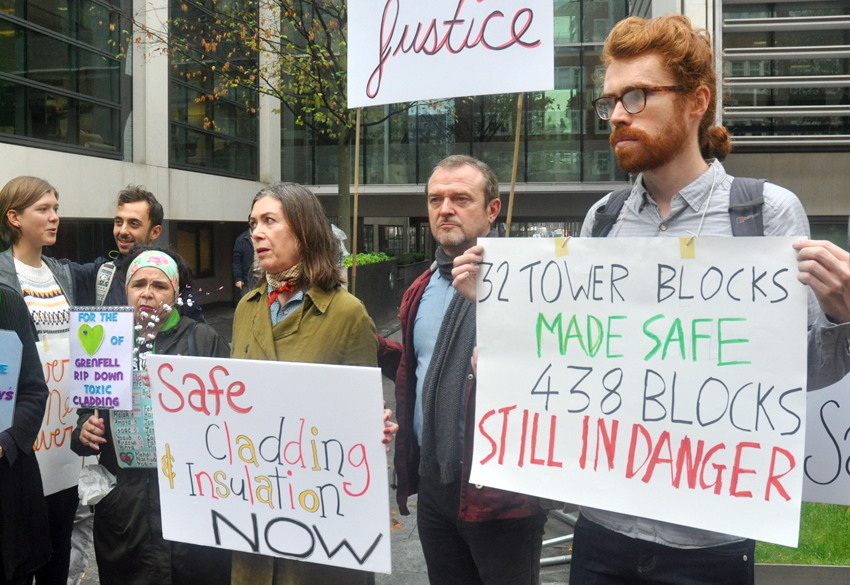THE NAO (National Audit Office) report on dangerous cladding confirms our worst fears, says the Fire Brigades Union (FBU).
The NAO published its report, Dangerous cladding: the government’s remediation portfolio on Monday, 4th November.
It shows that the cladding crisis is worse than expected, with more homes and other buildings still clad with flammable materials.
Remediation is slow and might take until 2037 – twenty years after the Grenfell Tower fire that killed 72 people – until the risks are dealt with.
The report reveals that there are an estimated total of 9,000-12,000 buildings of 11 metres or higher with unsafe cladding that require remediation
Only 4,771 of those buildings taller than 11 metres with unsafe cladding within Ministry of Housing, Communities and Local Government (MHCLG’s) remediation portfolio as at August 2024 have been identified for remediation.
Only 1,392 of those buildings had completed their remediation by August 2024.
MHCLG does not even know how many low-rise buildings (below 11 metres) have dangerous cladding.
Matt Wrack, Fire Brigades Union (FBU) general secretary said: ‘The facts that thousands of residential buildings remain wrapped in dangerous cladding is a national disgrace.
‘We stated from day one that this was a failure of government due to the obsession with deregulation.
‘The developers and construction firms must be made to pay the costs of remediation and the process needs to be speeded up.
‘Tenants, residents and firefighters should be part of the oversight of the work.’
- Poole firefighters have condemned a fire engine removal after a ‘week of chaos’.
The Fire Brigades Union has revealed that on-call firefighters at Poole were called out to 15 incidents in the week following the removal of one of Poole’s 24 hour crewed fire engines – five times the number of incidents predicted by the service.
On Monday 21st October, Dorset and Wiltshire Fire and Rescue Service removed Poole’s second full-time staffed fire engine, as part of a series of cuts to eight fire stations.
Poole fire station provides fire cover across the south of the region and is the busiest in the county.
The station has been left reliant on the on-call workforce — who are referred to as retained, meaning firefighting is not their primary employment — resulting in increased pressure on the service.
Plans to cut the appliance were scheduled for 2025 and have been condemned by firefighters and local MP Neil Duncan-Jordan.
Firefighters report that they received just over one week’s notice that these plans had been accelerated and their station would lose a fire engine this month.
Representatives of the service addressed a meeting of Poole’s retained firefighters, predicting that they would be called out to 2-3 incidents extra per week.
However, incident data reveals that between October 21 – 24, Poole firefighters were called to 15 incidents.
These included a house fire; water rescue; an attempted suicide; a road traffic collision; and a fire alarm in a high-rise tower. In addition, firefighters from Hamworthy were called out to nine incidents.
The FBU’s Matt Wrack, said: ‘Fire services have been stretched far too thin by austerity, with firefighters working under immense pressure to save lives and homes.
‘We need urgent investment in the fire service. Instead, residents of Dorset and Wiltshire are facing a further downgrading in fire cover.
‘Dorset and Wiltshire Fire and Rescue Service must put public safety before cost-cutting by bringing back the disappeared fire engines immediately.’
Val Hampshire, FBU Executive Council member for the South West said: ‘The sudden removal of Poole’s second fire engine has immediately put the public and firefighters at greater risk.
‘Slashing resources from one of the busiest fire stations in the county has already proved reckless and dangerous, pushing on-call firefighters beyond limits to respond to incidents.
‘This week of chaos has made the impact of cuts all too clear. The public deserve a fire service that is equipped to keep them safe: Dorset and Wiltshire Fire and Rescue Service must reverse the cuts now.’
Matt Wrack had written to Rachel Reeves ahead of Labour’s first budget, to call for urgent funding for the fire and rescue service.
While welcoming Labour’s workers’ rights package, the union warned that this approach ‘must be reflected in funding for pay offers in the public sector workers to avoid disputes similar to that faced by the fire service in early 2023.’
In the letter, Wrack said: ‘Low wages, crumbling infrastructure and inadequate public services are not just a blight on the lives of working people. They are also a threat to public safety.
‘Fire and rescue service response times are worse than ever before in recent history. It now takes more than nine minutes for a first appliance to reach a fire, significantly longer than it did thirty years ago.’
Labour had promised to re-establish national standards in the fire service.
However, Wrack warned: ‘We cannot deliver a resilient, joined-up fire service that is fit for the future without investment.
‘Under the Tories, the fire service lost 30% of its central government funding in cash terms.
‘Now, as the Labour Chancellor, you can deliver a Budget that marks the end of the catastrophic “austerity era”. The Labour government’s Budget must begin to make up for the decade and a half of constant cuts to services and wages that have left many firefighters and other workers struggling to make ends meet.’
